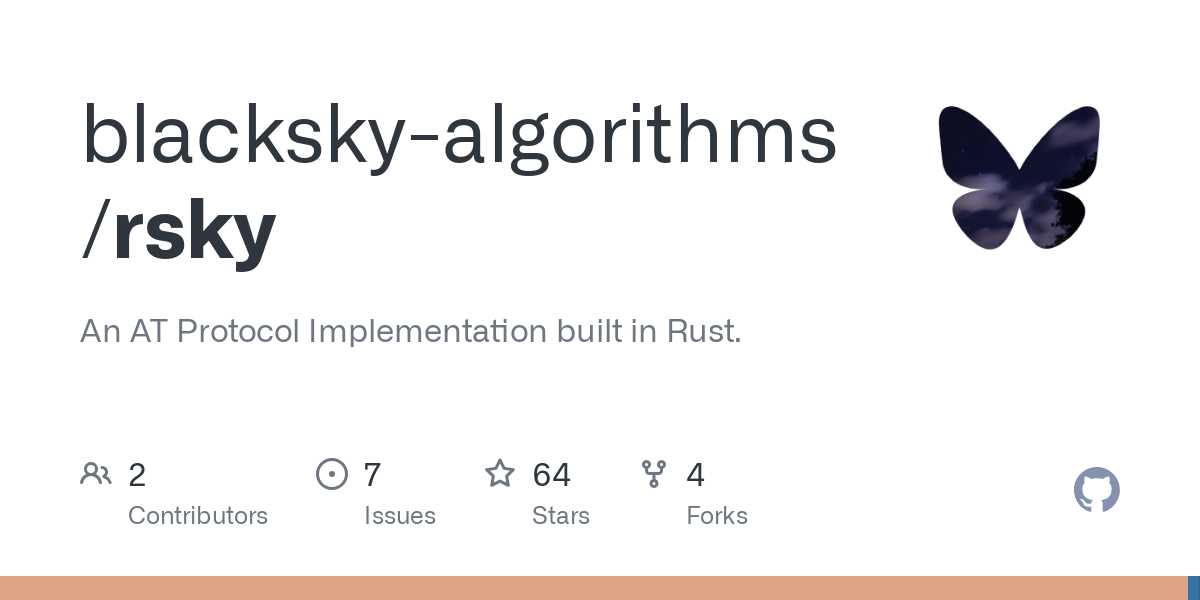Links:
- https://atproto.com - https://atproto.com/articles/atproto-for-distsys-engineers
- https://www.blackskyweb.xyz - https://bsky.app/profile/rudyfraser.com/post/3l6d7mmzhik2r
For a lot of us, atproto projects are some of the biggest (most users, most publicized, most code written, etc.) projects we’ve ever done. For me, it’s also my first time working in open source (ironically, someone asked me to be more open about that)
If you can help, pls check out open issues.
I know not everyone thinks highly of atproto around these parts, but please don’t let that get in the way of welcoming a fellow rustacean into the open source world 🦀
Some shallow observations without really getting into the code:
misc
- Was hosting
labeler/ResNet50_nsfw_model.pthin the repository really necessary?
(I like my--filter=tree:0clones to be maximally fast and small.) - Why not declare all dependencies in the workspace?
- How old is the code (for real)?
rsky-cryptoanyhowin library code.- Not liking that
multibasedependency much either. I know thatbase64at least got re-written since that crate’s last update (Nov 6, 2020).
rsky-feedgenserde_cboris long dead (I was a user myself).- I’m not even sure why
serde_cborandserde_ipld_dagcborare dependencies anyway. - We moved from
lazy_statictoonce_cella long time ago. And your use is available in std on stable Rust today.
rsky-firehose- Here, all three CBOR dependencies are actually used.
- CBOR (the format) used in
$CURRENT_YEARis meh anyway. But I guess that comes from IPLD.
rsky-identityanyhowin library code.
rsky-pds- That’s quite the dependency list! Too long for me to take a closer look.
- How many
*base*dependencies does one need? All of them of course!
rsky-syntaxlazy_staticandanyhowagain.
That’s all from a code organization and ecosystem PoV. Otherwise, things look normal and not fancy (which is good).
Unfortunately, I don’t have the time to look beyond that at this moment.
Appreciate the review! I’ve forwarded it to the dev :)
- Was hosting
+++
OK
ATH
NO CARRIER
OK
My initial thoughts too
Sharing for anyone else not familiar with AT Protocol:
The AT Protocol is an open, decentralized network for building social applications.
Account portability and Scalability through activity aggregation
Bluesky uses AT Protocol. The connected network/platform is called the Atmosphere.
Bluesky Social has pledged to transfer the protocol’s development to a standards body. - Wikipedia
I didn’t see any mention of other software/platforms using AT protocol on the protocol website or Wikipedia.
Yeah. I read the linked explanation by OP.
User repositories is basically how FMS on Freenet (now Hyphanet) works. The big difference is that JSON is used at AT instead of XML 😁. Also, things on Freenet are “content addressable” (what a buzz word) and immutable, always has been.
General data scalability is a part of the Freenet network model. App bandwidth and sync is admittedly not optimal, since on FMS, you basically pull from everyone’s feed to your database (bar the ones you distrust, or others you trust their distrust judgment distrust). But that can be trivially fixed by adding watchers split over the keyspace. These watchers can give users metadata about who to pull/update from. This of course was never actually needed since the user-base is small.
So reading about AT, I was left wondering. Is this really innovative? Then I read this part
Our founding engineers were core IPFS and Dat engineers
… and everything made sense. The masters of pretending they are coming up with new stuff are at it again.
The connected network/platform is called the Atmosphere.
Not sure that is a good name from a search or brand recognition perspective.
Yeah, I thought the same. Pretty bad name.
This is what I was looking after, thanks
cool, though I don’t like atproto
Why not?
Made by bluesky, just to be different from the rest. They could’ve added the features (e.g. DIDs) of atproto to activitypub, which is a standard, but they refused to do so.





